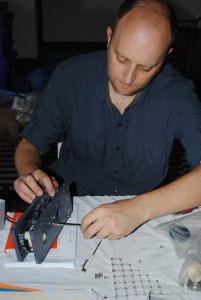Pumps and trucks in Brazzaville

Greg Fiske, GIS Manager / Research Associate, repairs a water pump in preparation for the river sampling.
We arrived successfully on Monday night in Brazzaville. The arrival in itself was no small feat given the 187 lbs of equipment we toted, packed into 4 massive waterproof bags (and 20-30 lbs each in our carry-on packs). Amazingly enough, all bags made the trip and we had to pay no extra fees for the additional baggages or weight.
Before leaving the states, we spent some time getting set up with wiring and plug apparatus that would allow us to power all of our gear in the field from a 12v car battery or vehicle cigarette lighter. Our gear includes a GPS/laptop combination running a full GIS (with associated local satellite imagery) that we hope will aid in navigation, and site selection, for all three projects on the fly. What’s more, this setup has already proven useful in Brazzaville with the sporadic electric service.
On Tuesday our first order of business was to meet up with Bienvenue Dinga (our Congolese colleague) and go to his lab to retrieve the water sampling supplies left behind from the last trip. All was in order, with the exception of a water pump that had looked like it was subject to a bit rough service. The remainder of the day was spent hunting for replacement parts to a burned out bearing and cog assembly. The pump isn’t essential, we’ve brought along a hand-crank substitute, but the idea of cranking out 20 liters or so of water at each sample site was enough for us to put in the extra effort to revive the electric version. A bit of copper pipe, silicon, super-glue and duct tape (or as Paul calls it “gaffer tape”) and we had a wobbly, but effectively operating DC pump that was ready for a field test. The added benefit of this snafu was that we were able to visit more markets and hardware sales folks than one could count on a single hand.

Paul Mann talks with market vendors in Brazzaville.
Securing a truck for next week’s journey was a priority on Wednesday’s task list. Vehicle rentals in Brazzaville are extremely pricey and, as with our hardware parts from the day before, bargaining was necessary. Bienvenue ended up working out a reasonable arrangement for a truck and a driver for 7 days that cost 1.25 million Cfa (about $2750). We will use this vehicle to travel from Brazzaville to Kabo while trying to revisit all of the water sampling locations from last February’s trip, and strategically choosing new ones.
Besides the water sampling, there are two more scientific goals on this trip. One, is for John Poulsen to select and visit field sites for experimental tree planting along our journey and two (if time permits) is to contribute to the pan-tropical biomass project by visiting GLAS (LIDAR) measuring points in the field and assessing biomass.
